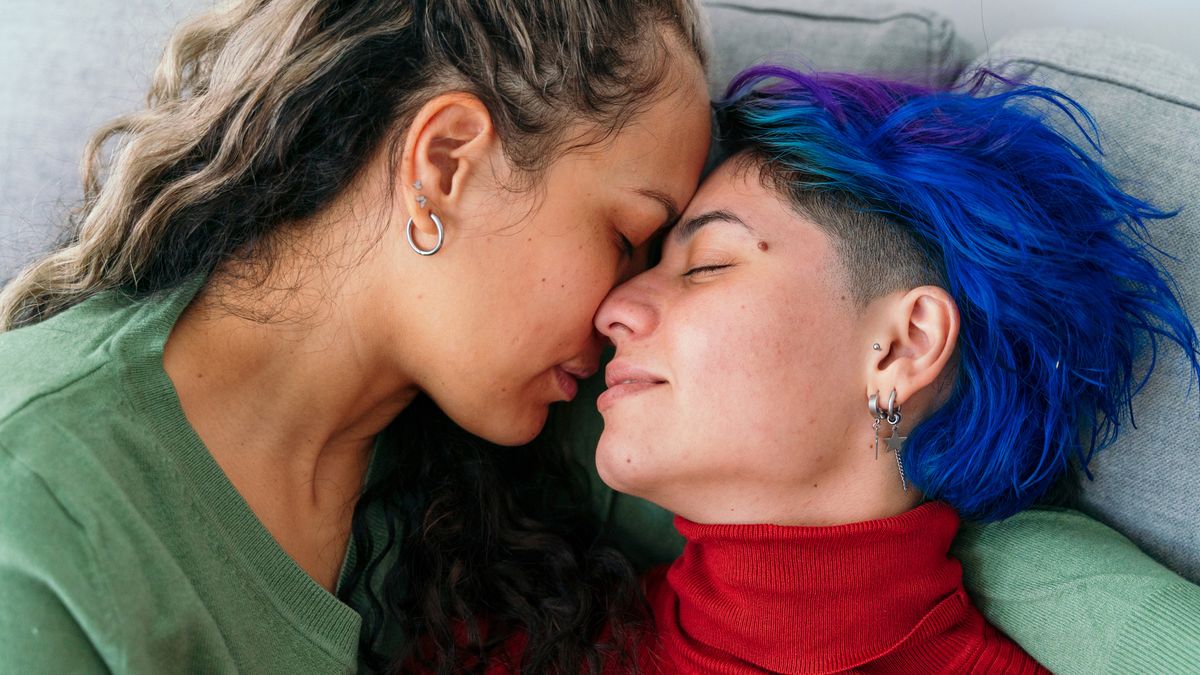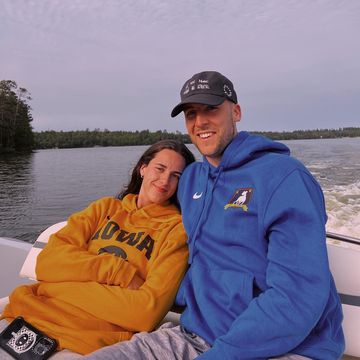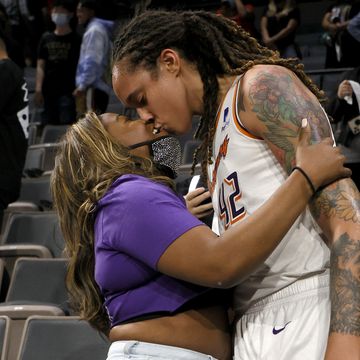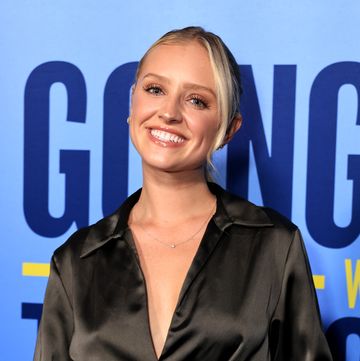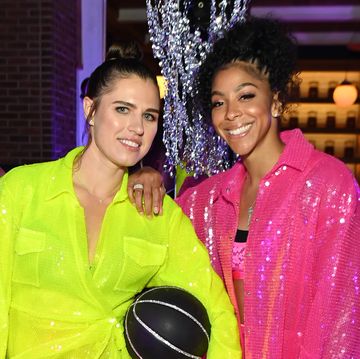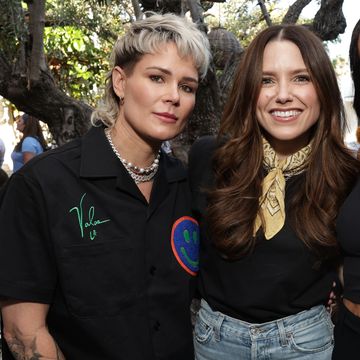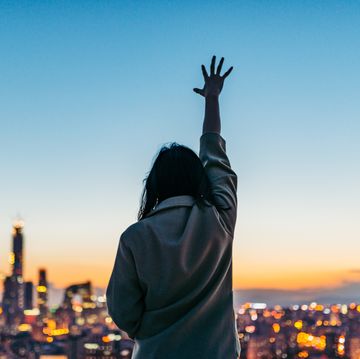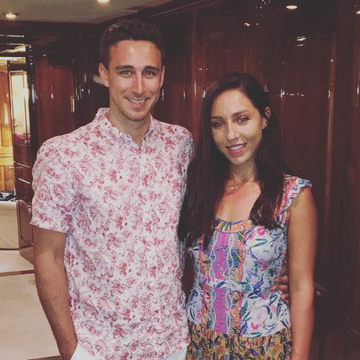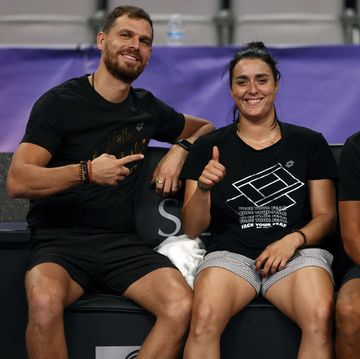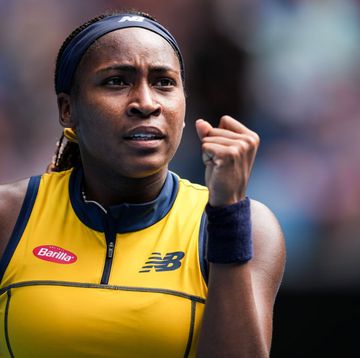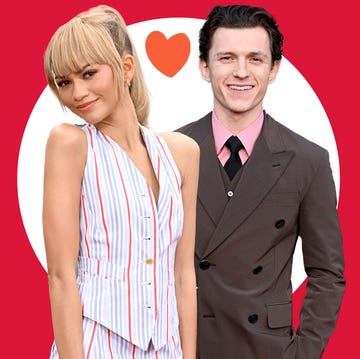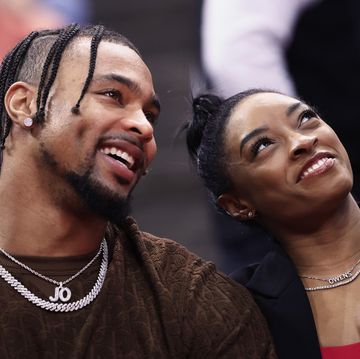Cue the eye roll every time some dude on The Bachelorette says, "I’m falling in love with you"... after spending approximately 457 seconds with the leading lady. Is that even possible? Seeing this on TV every week is sure to make you question how long it takes for people to fall in love IRL, and if your relationship is on the right track. In all honesty, it’s not as easy as The Bachelorette makes it seem (shocker!), and it’s completely natural for you to wonder about the real timeline of falling in love.
For many people, this curiosity can come from a desire for outside validation that their romantic connection is developing at a normal pace, says Shelley Sommerfeldt, PsyD, a clinical psychologist, relationship coach, and founder of the Loving Roots Project. "They may want to compare their feelings, reactions, and experiences with others to ensure they are on a typical progression," she explains. "Some partners may want to know how long it takes to fall in love to see if their partner 'should' be feeling a particular way toward them as well."
Meet the experts: Shelley Sommerfeldt, PsyD, is a clinical psychologist, relationship coach, and founder of the Loving Roots Project. Lisa B. Schwartz, PhD, LMFT, is a psychotherapist and AASECT-certified sex therapist serving clients in Pennsylvania, New Jersey, and Florida. Loretta G. Breuning, PhD, is the founder of the Inner Mammal Institute, professor emerita at California State University, and author of Habits of a Happy Brain: Retrain Your Brain to Boost Your Serotonin, Dopamine, Oxytocin, & Endorphin Levels.
Of course, every relationship is different, and there’s no “right” timeline that works for everyone. But still, you might want to know what to expect, especially in a new relationship, or if you’re new to relationships in general. Here’s the science behind falling in love—and the stats on how long it typically takes.
How long does it take to fall in love?
Physiologically, it takes just a fifth of a second (!) for all those make-you-crazy chemicals to fire at once and produce that in-love feeling, according to research published in The Journal of Sexual Medicine back in 2010. So, a contestant on the famed TV show could be basing their feelings on that rush.
On the other hand, while it is technically possible to experience that in-love feeling in less than a second, falling in love is still a process. "There are different stages that we can go through when falling in love, building attachment, and ultimately forming a romantic relationship," Sommerfeldt says. "It’s a process to experience initial physical attraction toward someone and then grow into feeling a deeper and stronger emotional connection."
So, how long does that process *typically* take? Well, it depends. "While most people believe women are first to fall in love, feel a greater degree of love, and express love quicker, the research does show that it’s men in heterosexual relationships who are first to fall in love and convey it to their partner," says Sommerfeldt, as evident in this 2010 study on heterosexual relationships, published in Evolutionary Psychology.
On average, men think about confessing their love 97 days into a relationship, while women don't consider dropping the L bomb until 149 days in, according to a 2011 study in the Journal of Personality and Social Psychology. Meanwhile, in relationships between two women, love or commitment is expressed after around six months, according to a 2000 study. Although, Sommerfeldt notes these timelines likely aren't due to evolution or biology as much as social and cultural pressures to move a relationship at a "normal" pace.
It’s also important to look beyond the gender binary with these stats, says Lisa B. Schwartz, PhD, LMFT, a psychotherapist and AASECT-certified sex therapist serving clients in Pennsylvania, New Jersey, and Florida. “There is so much more than gender that goes into expressing emotion, especially around the ‘love’ word,” says Schwartz.
Is it possible to fall in love at first sight?
Actually, some science suggests that love at first sight does exist. This is because you're wired for love, whether you want to be or not.
"The brain is naturally selected to focus on reproduction, even if you’re not consciously intending to do so," says Loretta G. Breuning, PhD, founder of the Inner Mammal Institute, professor emerita at California State University, and author of Habits of a Happy Brain: Retrain Your Brain to Boost Your Serotonin, Dopamine, Oxytocin, & Endorphin Levels. "Your brain is focused on survival, and reproduction is the pinnacle of survival."
Once you’re falling, it feels good. In fact, a culmination of several happy chemicals in your brain create a sensation of euphoria that's akin to a hit of cocaine, studies have shown. If you think you’re falling hard—whether it’s for someone you’ve known for years, or someone you went on one measly date with—here’s why you’re starting to swoon.
First, dopamine will surge in your brain, reinforcing pleasurable sensations. Breuning gives the example of walking into a bar and checking people out. "You have a specific idea of what it takes to meet your needs based on past experiences," she explains. As you scan the room, you think, that one. Suddenly, the chase is on.
Then, oxytocin, the love hormone associated with attachment, comes into play. It helps bond you to a potential romantic partner, and women release it by the boatload after sex with a mate, building trust.
The last hormone involved? Serotonin, which is sometimes generated from your partner’s social status. "Animals are hierarchical—when you get [an impressive or powerful] partner, it improves the survival of your young," says Breuning. That’s why you may be attracted to that winning athlete, the person with a cool job, or the jet-setter.
All that said, the jury’s still out on whether love at first sight really exists. Just over half of Americans—56 percent, to be exact—believe in it, while 41 percent do not, according to a 60 Minutes/Vanity Fair poll from 2013. Whichever side of the debate you're on, once you've fallen in love, chemistry takes over for everyone.
Do dating apps have an impact on how fast I’ll fall in love?
They’ve changed the game, for sure. Now, “we view falling in love, the availability of meeting potential partners, how we seek love,” in a different light, says Sommerfeldt. “Many couples may spend time online getting to know one another and screening profiles for the traits they desire rather than spending a lot of time in person.” In turn, this naturally changes the amount of time it would take for them to fall in love.
But technology also adds another layer of pressure “that people think they are supposed to fall ‘in love’ quickly and if they don’t, they are on to the next person,” says Schwartz. That's why it's important to give enough time to develop your connection to make sure it becomes a trusting and respectful one, she adds—whatever that may look like to you.
What are some signs that I’m in love?
If you’ve never been in love before, you may want some extra verification that you’re truly feeling that "can't-eat, can't-sleep, reach-for-the-stars, over-the-fence, World Series kind of stuff." After all, the concept is so hyped up that you may not know what to expect when you actually fall in love with someone. You might also just feel the pressure to fall—as Schwartz says, “Some people think they are ‘supposed to’ say it at a certain point in their relationship.”
While only you can determine whether you’re in love, there are some signals to watch out for. "Some signs that you may be in love could be feeling a strong desire to spend more time with your partner, be physically and emotionally connected to them, as well as an increased desire for intimacy and affection," Sommerfeldt says. "Many people will also want to know more about their partner, their stories, and history." Unsurprisingly, you’re gonna want to be around your person 24/7 and crave knowing everything about their life.
Sommerfeldt also says that some people notice themselves feeling happier overall, and laughing and smiling more. I’ll take those side effects!
How do I know whether I’m experiencing love or infatuation?
Don’t get me wrong—love and infatuation certainly have similarities! “Both are based on intense feelings without thinking clearly,” says Schwartz. This may look like ignoring certain “red flags” or idealizing the person, she adds.
Turns out, you may even be able to tell based on your line of vision, according to a 2014 study from the University of Chicago. The study found that one’s eye patterns will focus on a stranger’s face if they perceive that person as a potential romantic partner, but if they’re experiencing lust, they’ll look more at the person’s body. Makes sense.
But ultimately, it depends on the physiological response and depth of feelings toward the other person, says Sommerfeldt. “Infatuation is typically an idealized love that can come from a fantasy or obsession over someone who may be unattainable or a short-lived relationship,” she says. It might involve temporary feelings based on admiration.
Love, on the other hand, involves building passion, commitment, and affection for another person. “Love is connecting on a deeper level and wanting to get to know a person more thoroughly. Partners in love also tend to share interests and values,” Sommerfeldt adds.
And if you feel as though you want to experience sexual pleasure with someone and not necessarily a relationship, you're likely experiencing lust, adds Schwartz.
Are there any shortcuts to falling in love?
So you really want to fall in love, huh? Unfortunately, there are no shortcuts—it takes time to build an authentic connection. "Every person has their own unique experience when it comes to falling in love," says Sommerfeldt, adding that it’s all about how long it takes to "let your guard down." (As literally everyone on The Bachelorette says).
"One person may be able to build feelings of love and intimacy faster than another," she notes. And that's okay! When it comes to lasting love, slow and steady often wins the race.
TL;DR: There's no point in trying to rush it. Instead, take time to learn about each other, be open and emotionally available, and hold onto your own identity and sense of self.
How long does it take to fall out of love?
Okay, not to be a downer… But what about falling out of love? Is there a certain amount of time it takes for that lovey-dovey feeling to eventually fade away?
Well, that answer isn’t so straightforward, either. In fact, there are several themes that often lead to falling out of love, including loss, emotional pain, and a negative sense of self, per a 2013 study published in Nova Southeastern University’s Qualitative Report. The study also found that participants typically fell out of love “over time” and that it didn’t just happen overnight. Maybe your partner keeps on doing little things that bother you, or perhaps you end up realizing your values don’t align as much as you thought they did. All of these things stacked together may lead to a loss of love.
There are also some clear-cut signs that mean you may not be feeling the love anymore. A big one? You might start to distance yourself from your S.O., whether that’s physically, emotionally, or sexually, says Sommerfeldt. “People may notice that they aren’t viewing their partner’s with ‘rose-colored glasses’ any longer and they may notice more flaws and annoyances.”
There’s no exact timeline for how long it takes to fall out of love, but “the more we focus on the negative aspects, the higher the chance we have at falling out of love at a faster rate," says Sommerfeldt. "The process can often come as a surprise or feel more sudden than it actually is, but it [generally] happens gradually over time.”
Of course, it's not inevitable that you will fall out of love with your partner, but it is likely (and normal!) that your relationship will change over time.
Should I be concerned about falling in love TOO quickly?
Well, here's the thing: Those sweet, romantic brain chemicals "are designed to motivate you to take action to seek an unmet need," says Breuning. "Once that need is met, those chemicals are no longer stimulated." Your brain effectively says,"You found the one. Now what?"
For some, the answer may be to continue searching and chasing that high—a.k.a. emotional or physical cheating. For others, the end result might just be that feeling of love fading sooner than they'd anticipated (whomp, whomp).
Another potential snag, especially in this modern age of social media, is the tendency to compare your partner and relationship to others' once that initial excitement has worn off. "Your partner may have 500 good qualities, but your brain will focus on the 10 they don’t have," says Breuning.
Common thoughts like, What does everyone think of my partner? or What romantic dates do other people’s partners take them on? are threatening. They give you a grass-is-greener mentality, even when you're with a solid and worthy match. Try not to fall into the trap of comparisons—remind yourself why you went for your partner in the first place, says Breuning.
So, what do you do? After you fall in love, bask in it. But remember that your brain will soon want a new dopamine-oxytocin-serotonin hit. With your partner, you can always re-spark these feelings by planning some romantic date nights and spending quality time together, psychotherapist Franklin Porter, PhD, previously told Women's Health.
And don't forget to go after goals that drive you, like a higher position at work or new athletic personal best. Your happiness shouldn't depend on someone else.
That will help ensure those heart-eye-emoji feelings stay put for a happily ever after—no matter how quickly (or not) you fell in love.

Jessica Migala is a health writer specializing in general wellness, fitness, nutrition, and skincare, with work published in Women’s Health, Glamour, Health, Men’s Health, and more. She is based in the Chicago suburbs and is a mom to two little boys and rambunctious rescue pup.
Addison Aloian (she/her) is the assistant love & life editor at Women’s Health. Outside of topics related to lifestyle, relationships, and dating, she also loves covering fitness and style. In her free time, she enjoys lifting weights at the gym, reading mystery and romance novels, watching (and critiquing!) the latest movies that have garnered Oscars buzz, and wandering around the West Village in New York City. In addition to Women's Health, her work has also appeared in Allure, StyleCaster, L'Officiel USA, V Magazine, VMAN, and more.
Zoë Hecht is a California-based writer and editor who enjoys writing about beauty, fashion, lifestyle, and pop culture. She graduated from Loyola Marymount University, where she received her B.A. in English. Other than Women’s Health, her work can be found on Byrdie, Teen Vogue, and more. When she’s not writing, you can find her reading, sipping coffee, and scrolling through Pinterest.
